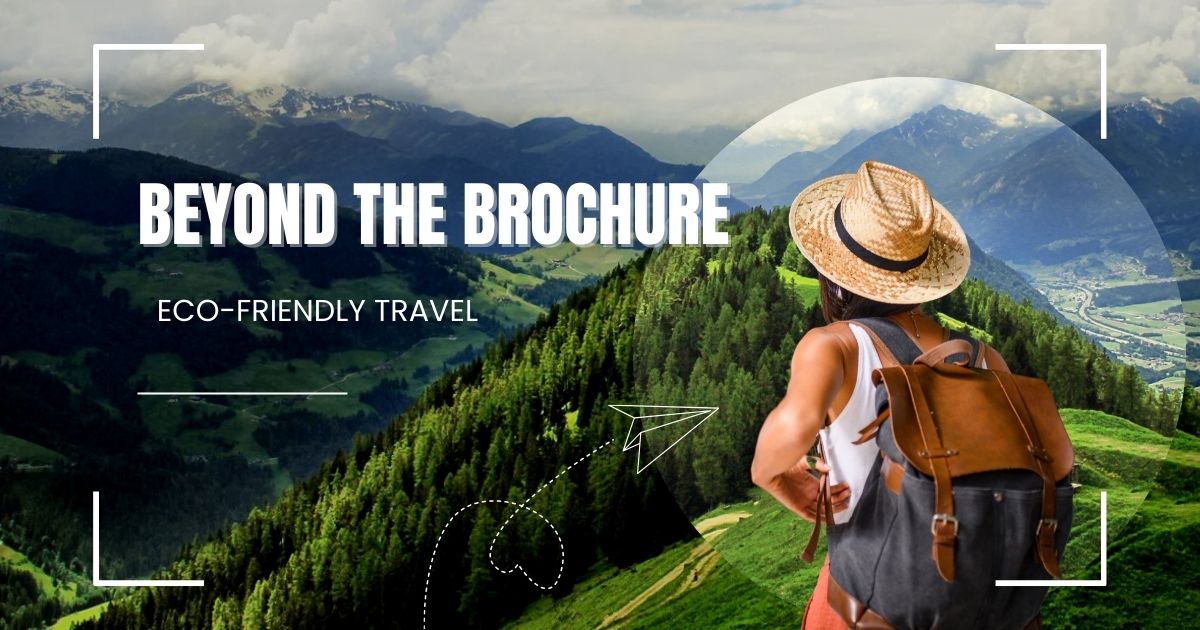
The Call of the Horizon: Redefining Our Wanderlust
Travel is woven into the fabric of the human spirit. It’s a powerful force for discovery, connection, and personal growth. We journey to stand in awe of ancient ruins, to feel the spray of a foreign ocean, and to taste flavors that rewrite our understanding of food. But as our world becomes more connected and travel more accessible, we face a critical question: what is the cost of our curiosity? The traditional model of tourism, often focused on high volume and low cost, has left indelible scars on our planet’s most beautiful and fragile places. The good news? There is a better way. A more conscious, intentional, and rewarding way to explore.
Welcome to the world of sustainable and eco-friendly travel. This isn’t about sacrificing adventure; it’s about enhancing it. It’s about understanding that every choice we make, from the flight we book to the souvenir we buy, has a ripple effect. This comprehensive guide will take you beyond the buzzwords and greenwashing. We’ll dive deep into the practical steps and philosophical shifts that transform you from a mere tourist into a mindful traveler—a guest of the world who leaves places better than they found them.
Why Sustainable Travel Matters More Than Ever

Before the global pause in travel, the tourism industry was a behemoth, accounting for over 10% of global GDP. While it brought economic opportunities, it also brought significant challenges. Overtourism was straining infrastructure in cities like Venice and Barcelona, fragile ecosystems like the coral reefs of Thailand were being damaged by pollution and crowds, and local cultures were often commodified, losing their authenticity.
The conversation around sustainable travel isn’t just an environmental one. It’s a holistic movement built on three core pillars. Understanding these pillars is the first step toward making informed and impactful decisions on your journeys.
The Three Pillars of Sustainable Travel
Think of sustainable travel as a stool with three legs. If one is weak, the whole thing topples over. A truly sustainable approach must balance environmental, social, and economic considerations. Click Here to explore more.
Pillar 1: Environmental Responsibility – Protecting Our Playground
This is often the first thing people think of when they hear “eco-travel.” It’s about minimizing your physical footprint and actively contributing to the conservation of the natural environments you visit.
Choosing Your Destination & Transportation
Your impact begins before you even pack your bags. Consider destinations that are actively promoting sustainable tourism or are less-trodden. This helps distribute tourist traffic away from overburdened hotspots. When it comes to getting there:
- Fly Less, Stay Longer: Air travel is a major contributor to carbon emissions. Instead of multiple short trips, consider one longer, more immersive journey. This “slow travel” approach is not only better for the planet but also allows for a deeper connection with your destination.
- Choose Direct Flights: Takeoffs and landings consume the most fuel. A direct flight is more carbon-efficient than one with multiple layovers.
- Embrace Ground Travel: Once at your destination, opt for trains, buses, or even cycling. It’s a fantastic way to see the countryside and reduce your carbon output significantly.
- Offset Your Carbon: While not a perfect solution, carbon offsetting programs (like those offered by Gold Standard or Terrapass) invest in renewable energy or reforestation projects to compensate for your flight’s emissions.
Packing Light & Right: Your Eco-Toolkit
Every kilogram counts on an airplane. The lighter the plane, the less fuel it burns. But packing smart is also about what you bring. Arm yourself with reusable items to refuse single-use plastics on the road:
- Reusable Water Bottle with a Filter: This is non-negotiable. It saves you money and prevents countless plastic bottles from ending up in landfills or oceans.
- Solid Toiletries: Shampoo bars, conditioner bars, solid toothpaste, and deodorant sticks reduce plastic packaging and aren’t subject to liquid restrictions.
- Reusable Shopping Bag & Produce Bags: Perfect for local markets and souvenir shopping.
- Reef-Safe Sunscreen: If you plan to swim in the ocean, use sunscreens without oxybenzone and octinoxate, chemicals known to cause coral bleaching.
- A Travel Utensil Set & Reusable Straw: Ideal for street food adventures, allowing you to say no to plastic cutlery.
The “Leave No Trace” Principle Deep Dive
Originally a code of ethics for the backcountry, the seven principles of Leave No Trace are universally applicable to all forms of travel. It’s about leaving a place as good as, or better than, you found it.
- Plan Ahead and Prepare: Research local regulations and conditions.
- Travel and Camp on Durable Surfaces: Stick to marked trails.
- Dispose of Waste Properly: Pack it in, pack it out. This includes organic waste like apple cores.
- Leave What You Find: Let nature’s souvenirs stay where they are.
- Minimize Campfire Impacts: Use existing fire rings and be aware of fire bans.
- Respect Wildlife: Observe from a distance. Never feed wild animals.
- Be Considerate of Other Visitors: Preserve the peace and natural quiet.
Pillar 2: Social & Cultural Responsibility – Connecting with Humanity
Sustainable travel is fundamentally about people. It’s about ensuring that your presence is a positive and respectful one, fostering genuine cultural exchange rather than exploitation.
Engaging with Local Communities Authentically
Move beyond the transactional. Learn a few phrases in the local language (“hello,” “thank you,” “please”). Show genuine curiosity about people’s lives beyond their role as service providers. Ask questions, listen to stories, and share a piece of yourself in return. This is where the true magic of travel happens.
Respecting Customs and Traditions
What is perfectly normal at home might be offensive elsewhere. Research cultural norms before you go.
- Dress Code: Be particularly mindful when visiting religious sites. Covering shoulders and knees is a common sign of respect.
- Gestures and Etiquette: Understand local table manners, greeting customs, and what gestures might be considered rude.
- Bargaining: In many cultures, haggling is expected and part of the fun. In others, it’s not. Know the difference and always bargain with a smile and a sense of fairness, not aggression.
The Ethics of Photography and Social Media
Your camera is a powerful tool, but it comes with responsibility. Always ask for permission before taking a close-up photo of someone, especially children. Consider whether your photo could perpetuate harmful stereotypes. When posting online, think about the impact. Are you geotagging a fragile, hidden gem that could be destroyed by a sudden influx of tourists? Sometimes, the most respectful thing to do is to put the camera away and simply be present.
Pillar 3: Economic Responsibility – Empowering Local Economies
Where your money goes is one of the most powerful votes you can cast while traveling. The goal is to ensure that the financial benefits of tourism stay within the local community, rather than being siphoned off by large, foreign-owned corporations.
Supporting Local Businesses vs. Big Chains
Make conscious choices to support the local economy directly:
- Accommodations: Choose locally-owned guesthouses, homestays, or eco-lodges over international hotel chains.
- Food: Eat at local restaurants and street food stalls. Not only is it more authentic and delicious, but your money goes directly to local families.
- Shopping: Buy from local artisans and markets. You’ll get a unique, handmade souvenir with a story.
Choosing Ethical Tour Operators
Do your homework. Look for tour companies that hire local guides, pay fair wages, and have a clear, transparent sustainability policy. Be especially critical of any tour involving animals. Is it an authentic wildlife sanctuary focused on conservation and rehabilitation, or a for-profit enterprise that exploits animals for entertainment? A truly ethical sanctuary will not allow riding, forced performances, or direct, unsupervised contact with wild animals.
Putting It All Together: Planning Your First Sustainable Trip
Feeling inspired but a little overwhelmed? Here’s a step-by-step approach to integrate these principles into your next adventure.
Step 1: Research & Vetting
Dedicate time to research. Look for certifications like B Corp, Fair Trade Tourism, or Green Globe, but don’t stop there. Read reviews, check their website for a detailed sustainability policy, and don’t be afraid to email a hotel or tour operator with specific questions: “How do you manage your waste?” “Do you hire staff from the local community?” “What is your relationship with the nearby national park?” A truly sustainable business will be proud and eager to answer.
Step 2: The Conscious Itinerary
Resist the urge to cram too much in. Embrace slow travel. Instead of spending two days in five different cities, spend ten days in one region. This reduces your travel footprint and allows you to build relationships and discover hidden gems you’d otherwise miss. Plan your activities around local, sustainable providers you vetted in Step 1.
Step 3: On The Ground
This is where your preparation pays off. Use your reusable water bottle. Politely decline plastic straws. Eat at that small, family-run restaurant. Engage in conversation with your local guide. Be mindful of your water and electricity consumption in your hotel. These small, daily actions collectively create a massive positive impact.
The Future of Travel: A Collective Responsibility

Sustainable travel is not about perfection; it’s about progress. It’s about being a more mindful, intentional, and compassionate traveler. It’s a journey of continuous learning and improvement. Every trip is an opportunity to do a little better, to ask better questions, and to make more conscious choices.
By embracing these principles, we do more than just preserve the world’s wonders for future generations. We enrich our own travel experiences, transforming them from fleeting vacations into profound, meaningful connections with the planet and its people. The world is waiting. Let’s explore it with the respect and care it deserves.










Leave a Reply